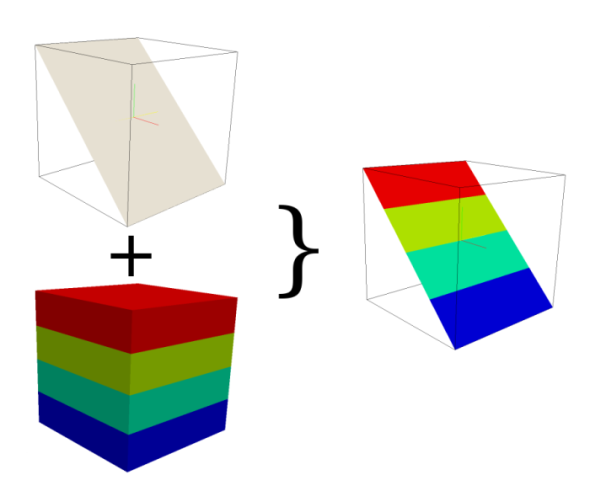
Note: A new GRASS GIS stable version has been released: GRASS GIS 7. Go directly to the new manual page here
NAME
r3.cross.rast - Creates cross section 2D raster map from 3D raster map based on 2D elevation map.
KEYWORDS
raster3d, voxel
SYNOPSIS
r3.cross.rast
r3.cross.rast help
r3.cross.rast [-m] input=string elevation=string output=string [--overwrite] [--verbose] [--quiet]
Flags:
- -m
- Use 3D raster mask (if exists) with input map
- --overwrite
- Allow output files to overwrite existing files
- --verbose
- Verbose module output
- --quiet
- Quiet module output
Parameters:
- input=string
- Input 3D raster map for cross section
- elevation=string
- 2D elevation map used to create the cross section map
- output=string
- Resulting cross section 2D raster map
DESCRIPTION
This module creates a cross section 2D map from one 3D raster volume
map based on a 2D elevation map. It checks if the value of the
elevation map is located in the z-coordinate space of the 3D map. If
so, the 3D voxel value for this position is transferred to the related
cross section output map cell, otherwise the NULL value is set.

If the 2D and 3D region settings are different,
the 2D resolution will be adjust to the 3D resolution.
NOTES
To create a cut plane elevation map use r.mapcalc. Some examples:
- To create a cut plane elevation map in x direction type
r.mapcalc "cutplane = col()*x",
x be the value for
the elevation. If the range of col() is 1 ... 10, the elevation map
has the range 1 ... 10 if x == 1 and if x == 10 the range 10
... 100
- To create a cut plane elevation map in y direction type
r.mapcalc "cutplane = row()*x",
x be the value for
the elevation. If the range of col() is 1 ... 10, the elevation map
has the range 1 ... 10 if x == 1 and if x == 10 the range 10
... 100
- The user can also make a cut in y and x direction with r.mapcalc by
using
r.mapcalc "cutplane = (row()+col())*x"
EXAMPLE
Simple Spearfish example
g.region -d
g.region res=150 res3=150 t=1000 b=0 tbres=100
# synthetic data, could be geological structures:
r3.mapcalc "map3d = sin(row())+sin(col())+sin(depth()*depth())"
#create a cutplane map
r.mapcalc "cutplane = col()*10"
#create the cross section map
r3.cross.rast input=map3d elevation=cutplane output=crosssection
SEE ALSO
g.region,
r.mapcalc,
r3.mapcalc,
r3.to.rast
AUTHOR
Sören Gebbert
Last changed: $Date: 2013-03-26 14:08:02 -0700 (Tue, 26 Mar 2013) $
Main index - raster3D index - Full index
© 2003-2016 GRASS Development Team


